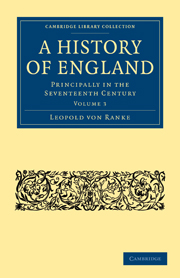Book contents
- Frontmatter
- Contents
- BOOK XI THE COMMONWEALTH IN ENGLAND, 1649—1653
- BOOK XII THE PROTECTORATE OF OLIVER CROMWELL, 1653–1658
- BOOK XIII FALL OF THE PROTECTORATE AND THE COMMONWEALTH. RESTORATION OF THE MONARCHY, 1658—1660
- BOOK XIV THE FIRST FIVE YEARS UNDER CHARLES II. THE RESTORATION OF THE ANGLICAN CHURCH
- CHAP. I The state of affairs at the Restoration
- CHAP. II The Convention Parliament in the summer of 1660
- CHAP. III Foreign policy. Marriages in the Royal Family
- CHAP. IV Religious differences. The Coronation. A new Parliament
- CHAP. V The first two years of the Long Parliament of the Restoration. The Act of Uniformity
- CHAP. VI Relations with France. Sale of Dunkirk
- CHAP. VII A scheme for reunion with Rome. Claim to the dispensing power. Personal relations in Court and State
- BOOK XV THE DUTCH WARS OF CHARLES II. ESTABLISHMENT OF THE PROTESTANT AND PARLIAMENTARY CHARACTER OF THE CONSTITUTION 1664—1674
CHAP. VII - A scheme for reunion with Rome. Claim to the dispensing power. Personal relations in Court and State
Published online by Cambridge University Press: 07 June 2011
- Frontmatter
- Contents
- BOOK XI THE COMMONWEALTH IN ENGLAND, 1649—1653
- BOOK XII THE PROTECTORATE OF OLIVER CROMWELL, 1653–1658
- BOOK XIII FALL OF THE PROTECTORATE AND THE COMMONWEALTH. RESTORATION OF THE MONARCHY, 1658—1660
- BOOK XIV THE FIRST FIVE YEARS UNDER CHARLES II. THE RESTORATION OF THE ANGLICAN CHURCH
- CHAP. I The state of affairs at the Restoration
- CHAP. II The Convention Parliament in the summer of 1660
- CHAP. III Foreign policy. Marriages in the Royal Family
- CHAP. IV Religious differences. The Coronation. A new Parliament
- CHAP. V The first two years of the Long Parliament of the Restoration. The Act of Uniformity
- CHAP. VI Relations with France. Sale of Dunkirk
- CHAP. VII A scheme for reunion with Rome. Claim to the dispensing power. Personal relations in Court and State
- BOOK XV THE DUTCH WARS OF CHARLES II. ESTABLISHMENT OF THE PROTESTANT AND PARLIAMENTARY CHARACTER OF THE CONSTITUTION 1664—1674
Summary
We possess a report of Henry Bennet, dating from the days when the question as to the Bill of Uniformity was decided. He was a man who even then enjoyed to a high degree King Charles's confidence, and was destined before long to attain to the highest positions. It is evident from this document how serious was the anxiety felt at court lest the general discontent should lead to an outbreak of disturbances and a fresh civil war. Bennet was of opinion that it would be by no means safe to dispense with the precautionary measures already adopted, since to do so would be to encourage factions and weaken authority. It was necessary on the contrary to carry them out energetically, and with this object to strengthen the military force, in London by recalling thither the troops from Dunkirk, and that in the counties by the precautions of the lord-lieutenants: in a few months every movement might be suppressed, and then the King could think of milder measures.
Stimulated by the rupture which had occurred between the Episcopalians and Presbyterians, the Baptist and Republican sects, whom they had defeated when united, were in a state of eager rebellious commotion. The speeches of the regicides especially, which had been printed singly or collectively and were widely read, kept their minds in a state of ferment. The words which they had uttered when about to die were readily believed, and their speedy return to life was seriously expected.
- Type
- Chapter
- Information
- A History of EnglandPrincipally in the Seventeenth Century, pp. 393 - 412Publisher: Cambridge University PressPrint publication year: 2010First published in: 1875

